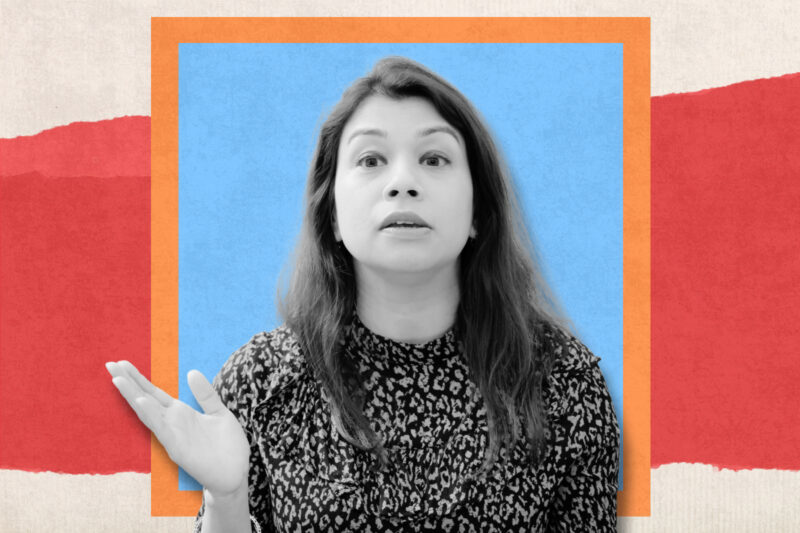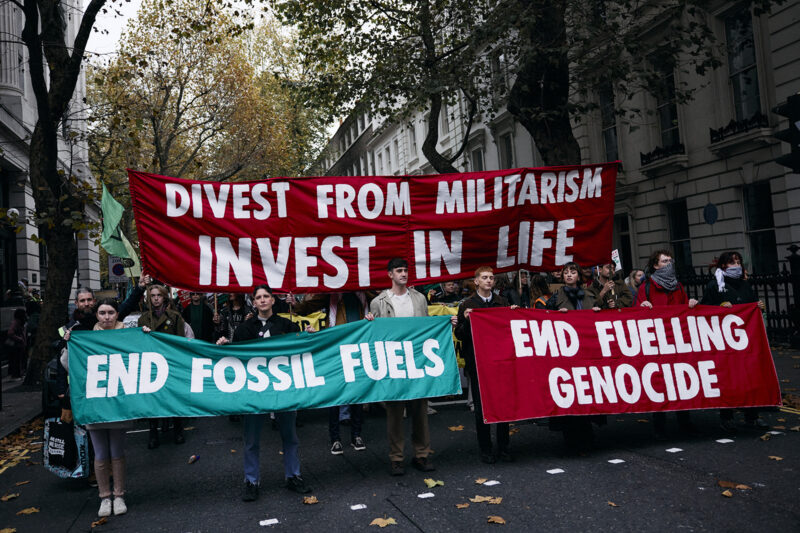
Tessa Khan Q&A: ‘The UK has a responsibility to lead the fight against climate change’
Ordinary people holding the government to account over climate policies is ‘really powerful’, Khan says. Photography courtesy of Uplift
The climate change lawyer and founder of Uplift discusses the future of fossil fuel projects, and how ordinary people can hold power to account
Just 80 miles off the Shetland coast in the North Atlantic lies the Rosebank oilfield, said to contain around 300 million barrels of untapped oil.
This time last year, the Conservative government gave the green light for energy companies Equinor and Ithaca Energy to develop the oilfield — a highly controversial move amid the rising number of climate-induced disasters across the world. It’s estimated that burning Rosebank’s gas and oil reserves would release more than 200 million tonnes of CO2.
In December 2023, environmental groups Uplift and Greenpeace filed separate legal challenges to the government’s decision, arguing that the Tories signed off on the project without taking into account the full extent of the damage it will do to the planet.
A decision by the supreme court in London in June held that planning bodies must consider the climate impact of producing oil and gas as well as the emissions that will result from burning it. The UK government subsequently confirmed it was dropping its legal defence of the Rosebank and Jackdaw oilfields.
Hyphen sat down with Tessa Khan, international climate change lawyer and founder of Uplift — an organisation that supports a fair transition away from oil and gas production in the UK — to hear about the landmark court decision, what it means for phasing out new oil and gas fields, and why wealthy countries must be held accountable for their high emissions.
The UK government has recognised that approving the Rosebank oilfield without taking into account the full extent of its climate impact was unlawful. What does that mean in practice?
The court still has to make its own independent assessment of whether or not the decision was unlawful. We are optimistic that ultimately the court will agree with us and the government that it was an unlawful decision, in which case it’s then up to the oil and gas companies Equinor and Ithaca Energy, which are trying to develop the field, whether or not they want to apply to the government again to have it developed. If they do, then we really hope that the UK government says no this time. It was a terrible decision made by the Conservatives. We know that Labour’s thinking much more critically and thoughtfully about oil and gas and we hope that they would say no to Rosebank.
Uplift has shown how legal action can be a vital tool in tackling the climate crisis. How else can governments and big business be held accountable?
Ordinary people across the UK are doing an amazing job of holding the government accountable already, whether through showing up in protest or writing to their MPs. All of these things are really powerful, and in a democracy they have to listen to us.
We now have a government that has committed to a much more progressive climate policy than the previous one.
But earlier this year, Keir Starmer made a U-turn on a £28bn green spending pledge before he was even elected. Do you think this government will be firm enough on green issues?
I hope so, because so much of what the government is emphasising, which is growth and economic prosperity, goes hand in hand with the development of our green industries, which the UK has massive advantages in. We have had a world-leading offshore wind industry. There are lots of people in the UK with skills that could be deployed in those industries, and we could be at the forefront of all of the prosperity that that generates. We’ll have to wait and see, but I think there’s every reason to think that they should adopt that approach.
There’s also been a clampdown on the right to protest in recent years. How do you think that has affected the climate movement in the UK?
It’s extremely concerning. We’ve seen really disproportionate prison sentences handed to people engaged in protests. And, of course, that will deter some people from getting involved, especially if you’re an immigrant, if you’re a person of colour, or if you’re someone who has reasons not to trust the criminal justice system or to think that it might not work as fairly for you as it does for other people.
What are some of the biggest challenges in phasing out new oil and gas?
The gas industry has every reason to keep wanting to make profits from what has been a really lucrative line of business for them. Over the past two years, gas prices have gone up and they have made record profits, so, of course, they want to keep things that way. That’s meant that ordinary people across the UK have also seen their household energy bills go up.
But the truth is that we know we can have an energy system that is much less reliant on oil and gas, not just without compromising people’s lifestyle, but also making people’s lives better — warmer homes, more affordable energy, cleaner air and cleaner streets. Those are all things we could have with much less oil and gas in our energy system. It’s technically possible; we just have to make sure our governments are willing to take on these profiteering companies and put people like us first.
The world’s poorest countries have contributed the least to global emissions but are the most climate-vulnerable. How can wealthier nations who are the biggest emitters address the imbalance of power?
In a country like the UK — which is where the industrial revolution started and where our reliance on fossil fuels all started — we really have a responsibility to lead the fight against climate change.
Poorer countries most affected by the climate crisis have been asking for financial support to deal with the impacts that they’re already experiencing, because they’ve done next to nothing to contribute to climate change in terms of their emissions. To be clear, those impacts are here now and causing massive amounts of damage, whether that’s really intense rainfall and flooding in South Asia recently, or record-breaking heat across other parts of Asia, and drought in Africa.
Of course, we’re seeing the impacts in Europe as well, but really it’s those countries that are bearing the brunt of it. This includes countries like Pakistan and Nigeria who are rightly asking for support to decarbonise their own economies and make sure that they themselves aren’t contributing more and more emissions to the volume that’s already unsafe in the atmosphere. It’s absolutely incumbent on the UK and other wealthy countries that have had high historical emissions to contribute funding so that those countries can cope with the impacts of a crisis that they did nothing to create.
Tell us how you became interested in social and climate justice.
I grew up in Australia but my family’s from Bangladesh and we spent quite a lot of time there when I was growing up. I was always very conscious of the massive inequality between those two countries and how fortunate I was that my parents — through both good luck and hard work — managed to survive abroad. They provided the kind of life for me and my sister that really would have been unimaginable in Bangladesh. I’m just so conscious of how much of that is luck and the injustice that’s inherent in that. Bangladesh is also on the frontline of the climate crisis. It became clear to me that the biggest crash globally to our human rights and to all of the gains we’ve made in terms of social and economic inequality is the climate crisis. I was always very motivated by that, and that’s what’s taken me to doing human rights work and ultimately working on climate justice.
 Newsletter
Newsletter













